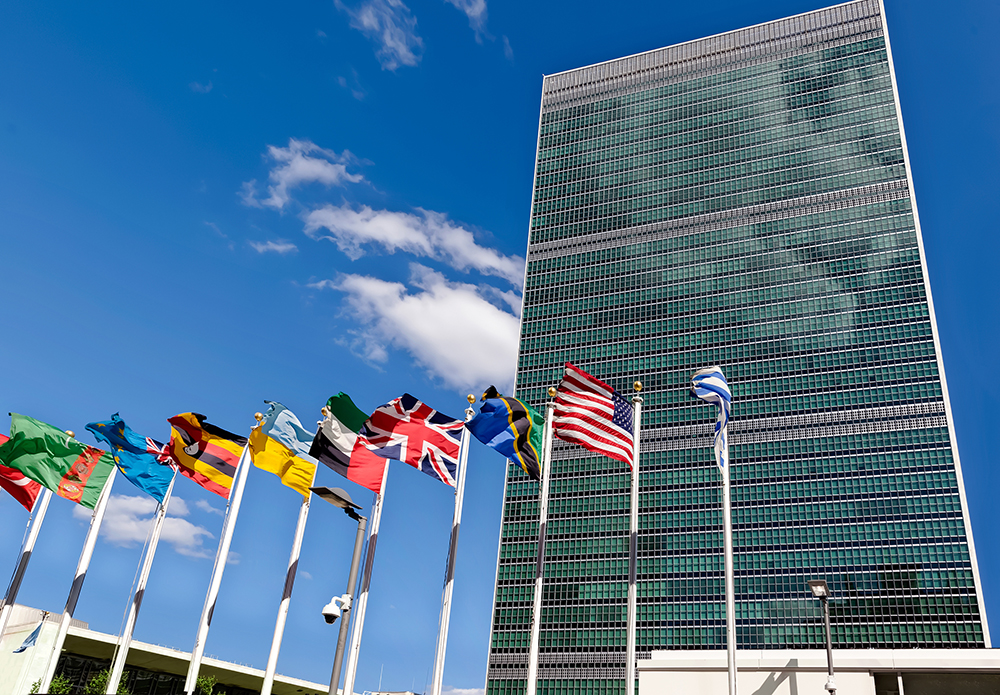Addressing the UN Security Council on September 20, 2023, Ukrainian President Volodymyr Zelensky delivered a heartfelt plea “to update the existing security architecture in the world, in particular, to restore the real power of the UN Charter.”
This call for strengthening international security under the aegis of the United Nations makes sense not only for Ukraine — a country suffering from brutal military invasion, occupation, and annexation by its much larger, more powerful neighbor, the Russian Federation — but for the nations of the world.
For thousands of years, competing territories, nations, and empires have spilled rivers of blood and laid waste to much of the world through wars and plunder. Hundreds of millions of people have died, while many more have been horribly injured or forced to flee their shattered homelands in a desperate search for safety. World Wars I and II, capped off by the use of nuclear weapons to annihilate the populations of entire cities, brought massive suffering to people around the globe.
In 1945, this mad slaughter and devastation convinced farsighted thinkers, as well as many government leaders, that human survival was dependent upon developing a framework for international security: the United Nations. The UN Charter, adopted in a conference in the spring of that year in San Francisco by 50 Allied nations, declared that a key purpose of the new organization was “to maintain international peace and security.”
The UN Charter, which constitutes international law, included provisions detailing how nations were to treat one another in the battered world emerging from the Second World War. Among its major provisions was Article 2, Section 4, which declared that “all members shall refrain in their international relations from the threat or use of force against the territorial integrity or political independence of any state.” Furthermore, Article 51 declared that “nothing in the present Charter shall impair the inherent right of individual or collective self-defense if an armed attack occurs against a member of the United Nations.”
Although the UN Charter provided for a General Assembly in which all member nations were represented, action to maintain international peace and security was delegated primarily to a UN Security Council with 15 members, five of whom (the United States, the Soviet Union, China, Britain, and France) were to be permanent members with the right to veto Security Council resolutions or action.
Not surprisingly, the right of any of these five nations to block Security Council peace efforts, a right they had insisted upon as the price of their participation in the United Nations, hamstrung the world organization from enforcing peace and international security on numerous occasions. The most recent instance has occurred in the case of the Ukraine War, a conflict in which, as Zelensky lamented, “all [Security Council] efforts are vetoed by the aggressor.” As a result, the United Nations has all too often lacked the power to enforce the principles of international law confirmed by its members and enshrined in its Charter.
Some people are perfectly content with the weakness of the United Nations. Fierce nationalists, as exemplified by Donald Trump and his Republican followers, are contemptuous of this or any international security organization, and many would prefer its abolition. Others have little use for the United Nations but, instead, place their hopes for the maintenance of international peace and stability upon public and governmental acceptance of great power spheres of influence. Meanwhile, a segment of the international Left ignores the United Nations and insists that world peace will only be secured by smashing “U.S. imperialism.”
Sadly, those forces opposing international organization and action fail to recognize that their proposals represent not only a return to thousands of years of international strife and mass slaughter among nations, but, in today’s world, an open door to a nuclear holocaust that will end virtually all life on earth.
Compared to this descent into international chaos and destruction, proposals to strengthen the United Nations are remarkably practical and potentially effective. Zelensky has suggested empowering the UN General Assembly to overcome a Security Council veto by a vote of two-thirds or more of the Assembly’s nations. In addition, he has proposed expanding the representation of nations in the Security Council, temporarily suspending membership of a Security Council member when it “resorts to aggression against another nation in violation of the UN Charter,” and creating a deterrent to international aggression by agreeing on the response to it before it occurs.
Of course, there are numerous other ways to strengthen the United Nations as a force for peace and to help ensure that it works as an effective international agency for battling the onrushing climate catastrophe, combating disease pandemics, and cracking down on the exploitative practices of multinational corporations. Its member nations could also rally behind the UN Treaty on the Prohibition of Nuclear Weapons (still unsigned by the nuclear powers), agree on a UN program to handle the burgeoning international refugee crisis, and provide the world organization with substantially greater financial resources to reduce global poverty and mass misery than it currently receives.
Indeed, the horrific Ukraine War is but the latest canary in the coal mine — the danger signal that people of all nations should recognize as indicating the necessity for moving beyond national isolation and beginning a new era of global responsibility, cooperation, and unity.
Dr. Lawrence Wittner, syndicated by PeaceVoice, is professor of history emeritus at SUNY/Albany and the author of Confronting the Bomb (Stanford University Press).

